Nutrient Guide
The Ultimate Guide to a Balanced Diet and Essential Nutrients
Introduction
Eating a balanced diet is crucial for maintaining good health and well-being. By consuming a variety of foods from different food groups, you can ensure that your body receives all the essential nutrients it needs to function optimally. In this guide, we will explore the components of a balanced diet and the key nutrients that contribute to overall health.
Components of a Balanced Diet
A balanced diet consists of a variety of foods that provide essential nutrients such as carbohydrates, proteins, fats, vitamins, and minerals. Here is a breakdown of the main food groups:
1. Fruits and Vegetables
Rich in vitamins, minerals, and antioxidants, fruits and vegetables should make up a significant portion of your daily intake. Aim to include a variety of colors to ensure you are getting a wide range of nutrients.

2. Grains
Whole grains such as brown rice, quinoa, and whole wheat bread provide essential carbohydrates, fiber, and B vitamins. Choose whole grains over refined grains for added nutritional benefits.

3. Protein
Protein is essential for building and repairing tissues in the body. Sources of protein include lean meats, poultry, fish, legumes, nuts, and seeds. Incorporate a variety of protein sources into your meals.

4. Dairy or Dairy Alternatives
Dairy products are rich in calcium and vitamin D, important for bone health. If you are lactose intolerant or vegan, opt for fortified plant-based alternatives such as almond milk or soy yogurt.

5. Fats
Healthy fats such as those found in avocados, nuts, seeds, and olive oil are essential for brain function and hormone production. Limit saturated and trans fats found in processed foods.

Essential Nutrients
In addition to following a balanced diet, it is important to pay attention to specific nutrients that play key roles in maintaining health:
- Vitamin C: Found in citrus fruits, bell peppers, and strawberries, vitamin C supports the immune system and aids in collagen production.
- Iron: Essential for oxygen transport in the blood, iron is abundant in lean meats, beans, and fortified cereals.
- Calcium: Crucial for bone health, calcium can be obtained from dairy products, leafy greens, and fortified plant milks.
- Omega-3 Fatty Acids: Found in fatty fish, flaxseeds, and walnuts, omega-3s help reduce inflammation and support heart health.
- Vitamin D: Necessary for calcium absorption and bone strength, vitamin D can be synthesized through sun exposure and found in fortified foods.
By incorporating a variety of nutrient-dense foods into your diet, you can ensure that you are meeting your body's nutritional needs and promoting overall well-being.
Remember, a balanced diet is not about strict limitations, but rather making healthy choices that nourish your body and mind.
Consult with a healthcare provider or nutritionist to tailor a diet plan that suits your individual needs and health goals.
